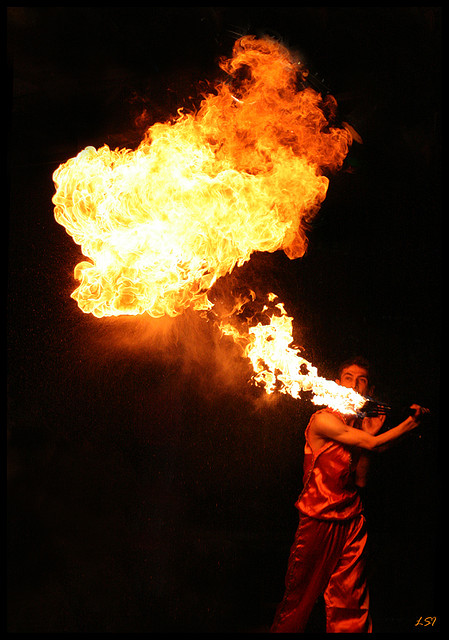FWP:
On the subtleties of nafas , see {15,6}. Arshi rightfully points to {143,2}, which is really strikingly close-- it too involves jalnaa , naa-tamaamii , and a nafas that is aatish-baar .
But this one really reminds me of {20,8}-- especially the second line: why would the lover have minded dying, if it had taken place one time [agar ek baar hotaa]? The possibilities here are the same as in that case. What exactly is the cause of the lover's lament? Here are three possibilities:
(1) The burning takes place not once, but many times-- so that he feels that he's died a thousand deaths.
(2) The burning takes place not all at once, but by degrees and in small increments-- so that he feels that he's being slowly tortured to death by flying sparks.
(3) The burning takes place not once, but never-- so that he's left longing vainly for the release that death would bring.
As is usual with Ghalib, each of these readings works perfectly with the second line. And in the first line, each yields a slightly different reading of jalnaa in the sense of 'to feel jealousy/envy' (on this see {53,4})-- in each case, the lover is jealous/envious of those lovers who have attained what he has failed to attain. And perhaps there's a secondary sense in which he's envious of the perfection, the completeness, that he's failed to achieve-- as in {60,1}, in which the lover {feels jealous/envious / 'burns'} over his own failure to 'burn up' completely at the sight of the beloved.
Nazm refers to the verse as describing a 'medical problem',
and I think he's just teasing. But Bekhud Mohani seems to speak in all seriousness.
At least he doesn't go so far as to claim that Ghalib had consumption at the
time he wrote this verse-- after all, in 1816 Ghalib was only about nineteen years
old. Let me not get started on another rant about the problems of necharal
shaa((irii as an approach to the ghazal.

Nazm:
That is, the heart {feels jealous/envious / burns} over the fact that every breath produces a movement of incendiary sparks, but incomplete ones. Why don't we burn up completely, all at one time? In so many places the author has versified this medical problem [maslah-e :tibb]! (78)
== Nazm page 78